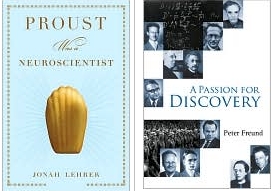Through this posting by Jonah Lehrer in the blog The Frontal Cortex, I learned of a wonderful commencement address (superb content, well delivered) given by Robert Krulwich at the 2008 Cal Tech graduation ceremony. (The address is in RealPlayer format and doesn’t actually occur until about 9 minutes and 15 seconds into the video; the early part is preamble and an intro by a member of Cal Tech’s board of trustees). Krulwich, correspondent for NPR’s Science Desk, reports on the intersections of science and technology with culture, politics and religion. The thrust of his Cal Tech address is that scientists need to tell their stories:
Because talking about science, telling science stories to regular folks like me and your parents, is not a trivial thing. Scientists need to tell stories to non-scientists because science stories have to compete with other stories about how the universe works and how it came to be….and some of those other stories, bible stories, movie stories, myths, can be very beautiful and very compelling. But to protect science and scientists – and this is not a gentle competition — you’ve got to get in there and tell yours.
Krulwich talks at length about Turkey, where good storytelling has popularized creationism. If scientists (and graduates from technical universities) use effective words, pictures, and metaphors in telling the stories of what they’re doing., Krulwich asserts, people won’t be as willing to accept the other stories (like creationism). Science stories won’t always win the day, he says, but the stories need to be told so there will at least be a tug-of-war between those stories and the others. Krulwich also notes that scientific experiments are in essence stories that may or may not be true — so scientists test these stories to discover the truth.
The address and Lehrer’s blog entry reminded me of another blog entry, this one about string-theorist and distinguished theoretical physicist Peter Freund, who writes stories about the way historical events affect scientists. The blog, Book Publishing News by BookCatcher.com, notes that Freund “packed his book, A Passion for Discovery, with stories about important 20th-century physicists and mathematicians.” (In his Exquisite Corpse online journal, Andrei Codrescu says the book comprises “a wonderful series of anecdotes about great physicists.”)
After he began writing A Passion for Discovery, Freund noticed certain narrative parallels between science and literature.
“There are really three narrative flows in physics,” Freund said. “One is at the level of the individual paper.” He added most papers in physics are short stories, in which concepts, rather than human characters, undergo adventures. “In the end, they emerge changed, occasionally with new concepts being introduced and promises that we will return to them, which is like what they call a sequel or a spin-off in Hollywood.”
The second narrative encompasses science as a whole. “Each time a really good paper is written, the older papers automatically all get rewritten,” Freund said. Undergraduates today can perform certain calculations in one line that in Sir Isaac Newton’s day would have required two pages. That’s because they know the mathematical descendants of Newton’s original work.
The third narrative of science is the human story. Freund emphasizes this narrative in his book, “but it is always entwined with these other two stories of a given paper or of the subject as a whole,” he said.
Returning to the Lehrer blog posting, a commenter suggested that Krulwich’s speech reminded him of Lehrer’s own book, Proust Was a Neuroscientist, about which reviewer Joseph LeDoux of New York University writes:
Taking a group of artists — a painter, a poet, a chef, a composer, and a handful of novelists — Lehrer shows how each one discovered an essential truth about the mind that science is only now rediscovering. We learn, for example, how Proust first revealed the fallibility of memory; how George Eliot discovered the brain’s malleability; how the French chef Escoffier discovered umami (the fifth taste); how Cézanne worked out the subtleties of vision; and how Gertrude Stein exposed the deep structure of language — a full half-century before the work of Noam Chomsky and other linguists. It’s the ultimate tale of art trumping science.
More broadly, Lehrer shows that there’s a cost to reducing everything to atoms and acronyms and genes. Measurement is not the same as understanding, and art knows this better than science does. An ingenious blend of biography, criticism, and first-rate science writing, Proust Was a Neuroscientist urges science and art to listen more closely to each other, for willing minds can combine the best of both, to brilliant effect.
The reviewer’s words, “Lehrer shows that there’s a cost to reducing everything to atoms and acronyms and genes. Measurement is not the same as understanding, and art knows this better than science does” suggest that stories foster this understanding better than does measurement.

